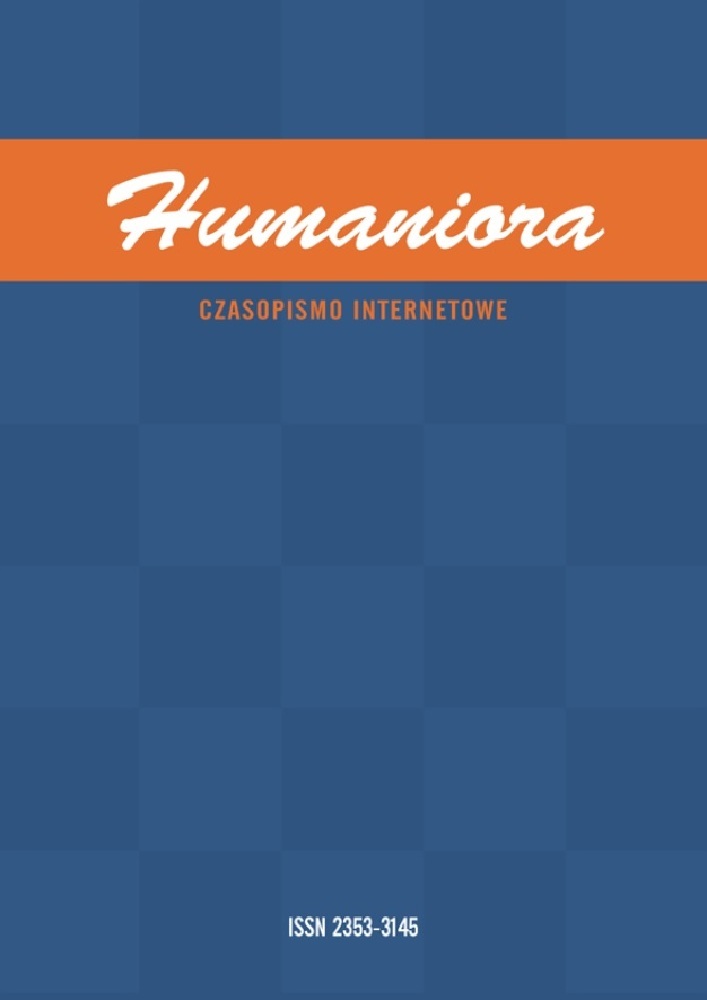Abstract
The present paper is an introduction to the debate on the contemporary methodology of research on myths. I attempt herein to elucidate the essence of myth, with the attempt being carried out in two parts. In the first part, I overview a history of the philosophical debate on the subject as well as I specify the reasons why myth ought to be reunited with truth anew, as was the case with Greek philosophers. In the latter part, I deal with the analysis of myth in relation with a human being – both in the individualist senseand in the social one, with the latter sense performing a significant role in understanding the world as well as humanity at large. Furthermore, I suggest what the essence of myth might be and what validity it can have for the contemporary man. The reflection included in the present text is inspired by some pertinent philosophical conceptions that allow me to show that it is possible to say something new about myth and the research thereupon.
References
Ajdukiewicz K., Zagadnienia i kierunki filozofii. Teoria poznania. Metafizyka, Czytelnik, Warszawa 1983.
Assmann J., Ma’at. Gerechtigkeit und Unsterblichkeit im Alten Ägypten, C.H. Beck, München 2006.
Barthes R., Mythologies, transl. A. Lavers, Hill and Wang, New York 2001.
Blumenberg H., Praca nad mitem, transl. K. Najdek, M. Herrer, Z. Zwoliński, Oficyna Naukowa, Warszawa 2009.
Bottici Ch., A Philosophy of Political Myth, Cambridge University Press, Cambridge 2007.
Campbell J., Moyers B., The Power of Myth, Anchor, New York 2001.
Carnap R., Oceny i normy to wypowiedzi pozbawione sensu, in: Metaetyka, ed. I. Lazari-Pawłowska, PWN, Warszawa 1975.
Cassirer E., The Philosophy of Symbolic Forms. Mythical Thought, vol. 2, transl. R. Manheim, Yale University Press, New Haven–London 1955.
Czeremski M., Struktura mitów. W stronę metonimii, Nomos, Kraków 2009.
Drozek A., Greccy filozofowie jako teolodzy, IFiS PAN, Warszawa 2011.
Eliade M., Myth and Reality, transl. W.R. Trask, Harper Torchbooks, New York 1963.
Flood G., Hinduizm. Wprowadzenie, transl. M. Ruchel, Wydawnictwo Uniwersytetu Jagiellońskiego, Kraków 2008.
Gadamer H.-G., Prometeusz i tragedia kultury, transl. M. Łukasiewicz, in: H.-G. Gadamer. Rozum, słowo, dzieje. Szkice wybrane, PIW, Warszawa 2000.
Heidegger M., Rzecz, transl. J. Mizera, “Principia. Pisma koncepcyjne z filozofii i socjologii teoretycznej” 1997, no. XVI–XVII.
Heinze M., Die lehre vom logos in der griechischen Philosphie, Ferdinand Schmidt, Oldenburg 1872.
Honko L., The problem of defining myth, “Scripta Instituti Donneriani Aboensis” 1972, no. 6.
Jaspers K., Chiffren der Transzendenz, Piper Verlag, München 1970.
Jaspers K., Der philosophie Glaube angesichts der Offenbarung, Piper Verlag, München 1962.
Judycki S. (2001). O klasycznym pojęciu prawdy, “Roczniki Filozoficzne” 2001, no. 49(1).
Kant I., Prolegomena to Any Future Metaphysics That Will Be Able to Come Forward as Science, transl. G. Hatfield, Cambridge University Press, Cambridge 1997.
Kohn L., Taoizm. Wprowadzenie, transl. J. Hunia, Wydawnictwo Uniwersytetu Jagiellońskiego, Kraków 2012.
Kołakowski L., Filozofia pozytywistyczna (od Hume’a do Koła Wiedeńskiego), PWN, Warszawa 1966.
Kołakowski L., The Presence of Myth, transl. A. Czerniawski, The University of Chicago Press, Chicago–London 2001.
Kwiatkowska E., Infiltracja kultur przez mit. Szkice, Akademia Pióra, Wrocław 2018.
Lakatos I., Falsification and the Methodology of Scientific Research Programmes, in: I. Lakatos. The Methodology of Scientific Research Programmes. Philosophical Papers, vol. 1. J. Worrall, G. Currie (eds), Cambridge University Press, Cambridge 1989.
Lévy-Bruhl L., Primitive Mentality, transl. L.A. Clare, Beacon Press, Boston 1966.
Lincoln B., Theorizing Myth Narrative, Ideology, and Scholarship, The University of Chicago Press, Chicago–London 1999.
Losev A.F., Dialektika mifa, Mysl’, Moskwa 2001.
Marion J.-L., God Without Being. Hors-Texte, transl. T.A. Carlson, The University of Chicago Press, Chicago–London 2012.
Morgan K. Myth and Philosophy. From the Presocratics to Plato, Cambridge University Press, Cambridge 2004.
Napiórkowski M., Mitologia współczesna. Relacje o poczynaniach i przygodach krajowców zamieszkałych w globalnej wiosce, Wydawnictwa Uniwersytetu Warszawskiego, Warszawa 2013.
Niżnik J., Mit jako kategoria metodologiczna, “Kultura i Społeczeństwo” 1978, no. 3.
Nouvelles Mythologies, ed. Garcin J., Seuil, Paris 2007.
Ortega y Gasset, J., Ideas y creencias, in: J. Ortega y Gasset. Obras Completas, vol. 5, Analiza, Madrit 1983.
Popper K.R., The Myth of the Framework, in: idem, Defense of Science and Rationality, Routledge, London–New York 2006.
Przełęcki M., Prawda, “Filozofia Nauki” 1993, no. 2–3.
Reale G., Historia filozofii starożytnej. Systemy epoki hellenistycznej, vol. III, transl. E.I. Zieliński, Wydawnictwo KUL, Lublin 1999.
Ricoeur P., Symbolika zła, transl. S. Cichowicz, M. Ochab, Pax, Warszawa 1986.
Rosenzwieg F., The Star of Redemption, transl. B.E. Galli, The University of Wisconsin Press, Madison 2005.
Welsch W., Philosophie und Kunst eine wechselhafte Beziehung, in: idem, Blickwechsel. Neue Wege der Ästhetik, Reclam Verlag, Leipzig 2012.
Żelazny M., Filozofia i psychologia egzystencjalna, Wydawnictwo UMK, Toruń 2011.
Żelazny M., Pojęcie znaku egzystencji i szyfru transcendencji w filozofii Jaspersa: (próba komentarza), “Humanistyka i Przyrodoznawstwo” 2011, no. 17.
License
Czasopismo oraz wszystkie zamieszczone w nim materiały są powszechnie dostępne i mogą być wykorzystywane do celów naukowych, edukacyjnych, poznawczych i niekomercyjnych bez konieczności uzyskiwania każdorazowej zgody autorów i redakcji. Nadesłanie artykułu do publikacji traktowane jest jako zgoda autora na udostępnienie swojej pracy i informacji w niej zawartych do powyżej wymienionych celów. W takich przypadkach należy jedynie wskazać źródło, z którego zaczerpnięte zostały informacje. Pobieranie opłat za dostęp do materiałów zawartych w czasopiśmie lub ograniczanie do niego dostępu jest zabronione.
Przesyłane do redakcji teksty muszą stanowić oryginalne prace, uprzednio nigdzie niepublikowane ani nie przedkładane innym redakcjom lub wydawcom. Autorzy nadsyłanych artykułów ponoszą odpowiedzialność za uzyskanie zezwoleń na publikowanie materiałów, do których prawa autorskie są w posiadaniu osób trzecich. Publikacja materiałów chronionych prawem autorskim jest możliwa pod warunkiem uprzedniego dostarczenia przez autora do redakcji pisemnej zgody właściciela praw autorskich.





